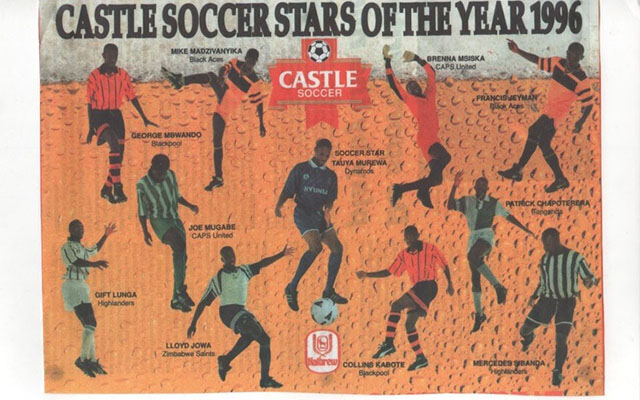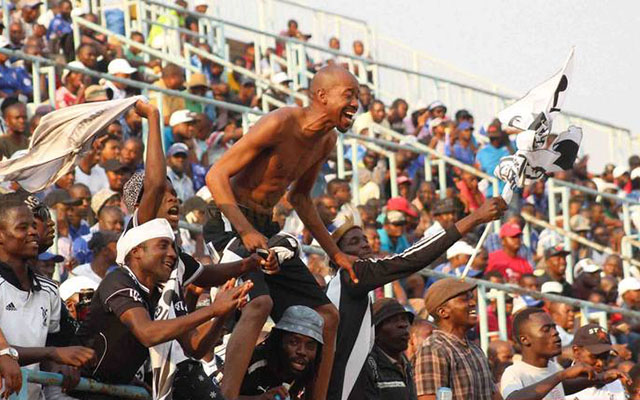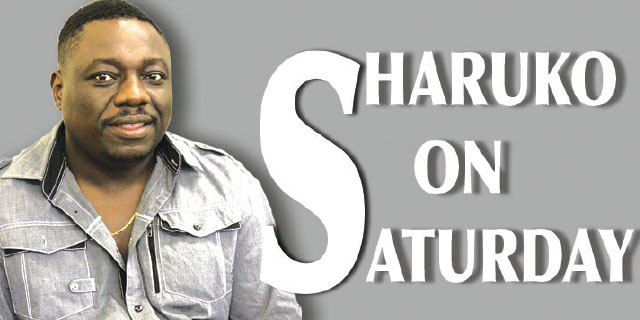Sharuko on Saturday
IT was a relatively short drive, from Harare’s Central Business District to Highlands and on Monday nights, the madness that usually characterises the traffic jungle of our capital would have long died down, replaced by the intoxicating beauty of a city at peace with itself.
We were just the two of us in my car. My passenger was someone I had been asked to pick up in town and bring to Pockets Hill as he was our guest that night on ZTV’s weekly authoritative football magazine programme, Game Plan, where I am one of the pundits.
He was someone very familiar, we had interacted a number of times before and — despite a bad boy image he had crafted on the football pitch in his short adventure on the big stage that had a fair amount of both controversy and trophies — he always handled me with a touch of respect.
It didn’t take long for him to open up to me, during that short drive to Pockets Hill, with every word he uttered in that car releasing the demons that were consuming his soul and the more he spoke, the more his mood started to change, taking a darker shade, while he also became more animated.
I listened, something I usually do on the occasions I find myself in the company of footballers, administrators or fans of this game, as my passenger rumbled on, and on, and on, covering a whole range of subjects, especially the depression that was weighing down heavily on him and slowly destroying his soul.
Rodreck Mutuma is quite a character who deeply divides opinion, depending on which side one is, and there were a lot of things he said that night, where his parade of both his arrogance and self-belief kept gaining a notch with every word he uttered from his mouth, as I humbly listened and performed my ad-hoc role as his chauffeur.
It became very clear to me he never considered himself to be a man of limited football gifts, who needed to work twice as much as the others for him to make a success story from his career, but clearly as one of those who had been blessed with an abundance of talent to propel him into super-stardom.
He told me the best footballers differentiated themselves from the average ones by the way they sparkled on the big stage, the beauty of the gospel which he was preaching to me being that he made it appear as if it’s something that I didn’t know, and he told me it wasn’t a coincidence he had scored the goals in the final that had won the Mbada Diamonds Cup for Dynamos in 2011 and 2012.
He said while the media had suggested he had flopped at Bloemfontein Celtic, leading to the club off-loading him, he didn’t look at it that way and, instead, merely viewed himself as a player who had run into a coach who didn’t like him and playing for a club where losing was very normal and, given he had served his apprenticeship at a Dynamos side where winning was part of their culture, the conflict of cultures affected his form.
Then, just like that, he dropped the big one.
“Blaz, you guys talk about Celtic, some describe me as a flop, that I failed to make the grade in the ABSA Premier League in South Africa forgetting that I have played at a higher level than that and against better players than those I faced during my time at Celtic and did very well,” he told me, the innocence of his beliefs clearly visible in every word he uttered.
“People easily forget that I played for the Warriors against Egypt in a (2014) World Cup qualifier in Alexandria, choose to forget that a German coach (Pagels) saw something in me to throw me into that match, forget that I partnered Knowledge (Musona) in that attack I did quite well against very strong opposition and yet want to label me a flop because things didn’t work out at Celtic.
“It’s not fair Blaz, if I can play in Alexandria against those Egyptians, whose quality is far better than the players in South Africa, and do as well as I did that day, playing away from home in a World Cup match, why should people doubt me?
“If a German coach says I’m good enough to play alongside Knowledge, for the national team in a World Cup match away from home, it means something Blaz because these guys know their football and I get hurt reading all the bad stuff about me in the newspapers or listening to what people say about me on the radio.
“I know my quality Blaz, no one can take that away from me, and I may not be as good as Knowledge, but if I am good enough to be his teammate for my country in a World Cup match that we lose 2-1 in Egypt, that should tell you something and that’s where I want to take my game back because I know what I can do.”
FOUR YEARS LATER, SALAH’s STAR IS SHINING BRIGHTEST WHILE RODDIE STRUGGLES ALONG
What Roddie didn’t tell me that night was that the captain of that Warriors’ side on that World Cup tour of duty in the Land of the Pharaohs was Denver Mukamba.
Musona, as he always does, scored for us in that game which was delicately balanced at 1-1 until Mohammed Aboutrika scored a controversial winner for the Pharaohs with less than two minutes left on the clock.
That Egyptian side also featured another forward, Mohamed Salah, born in the same year as Musona, who was making waves at Swiss side Basel, and although he failed to score in that match in Alexandria, he struck a hat-trick in the reverse game at the National Sports Stadium on June 9, 2013 in a 4-2 win for the Pharaohs.
Musona, once again, scored for the Warriors with the other goal coming from defender Lincoln Zvasiya while Mutuma was an unused substitute with Ovidy, Matthew Rusike and Silas Songani being the subs Pagels used that day.
A year later, Salah moved to Chelsea for US$14,2 million, the first Egyptian to join the London giants, and he struggled to make an impression, featuring in only three league matches, before being loaned to Italian clubs Fiorentina and Roma.
Salah, though didn’t let his disappointment at Stamford Bridge destroy him and, instead, used it as a challenge to prove wrong those who doubted his qualities and sent him out on loan and he thrived in the Italian Serie A so much that Liverpool broke their club transfer record to buy him for a fee that could rise to about US$58 million.
Salah isn’t alone in that bracket — Falcao failed miserably at Man U and Chelsea, but has sparkled in France at Monaco, Mario Balotelli failed at Man City and Liverpool, but has found his touch in France, Iago Aspas was a joke at Liverpool, but has become the main man at Celta Vigo in Spain while Filipe Luis was pathetic at Chelsea, but is now one of the stars at Atletico Madrid.
WHEN A FLYING DOCTOR RULED OUR FOOTBALL . . .

BLAST FROM THE PAST . . . In the week that former Dynamos captain Memory Mucherahowa has said a lot about the 1996 domestic football season, this Soccer Stars of the Year calendar from that year, also brought back a lot of memories
Juan Cuadrado was horrible at Chelsea, but turned out to be one of the star players who helped Juventus qualify for the Champions League final while Jerome Boateng failed horribly at Manchester City, but has flourished at Bayern Munich and won the World Cup with Germany.
These cases probably prove Mutuma was, to some extent, right in his argument, in my car that night, when he said if a player struggles to make an impression at his new club it doesn’t necessarily mean he should be dismissed as a flop and his critics shouldn’t jump on that to use as ammunition to nail him as a lost cause.
It could also be used to justify Mukamba’s argument that he doesn’t believe it’s fair for critics to feast on his doomed mission in South Africa, where he failed miserably to make an impression at about three clubs, and use that as part of their ammunition to say he isn’t as good as some might have been suggested.
What Mutuma didn’t remind me, which he could have done, that night was something that Sir Alex Ferguson said as the media feasted on his big signing, Juan Sebastian Veron, as the Argentine struggled to make an impression at Old Trafford after Manchester United had paid a lot of money for him.
“On you go. I’m f*****g talking to you. He’s a f*****g great player. You are f*****g idiots,” Fergie thundered to the army of journalists.
This week, Mutuma and Mukamba were back in the headlines, some will say for the wrong reasons again, after Roddie abruptly ended his romantic flirtation with Highlanders, after only six months, and made the journey back to the capital.
The same Roddie who, just a few months ago, told us that this was the club of his dreams, the one his instincts had been searching for, and the outpouring of love that he was getting in the City of Kings was just what he had been looking for.
“I am excited by the love the fans have shown me and I have to pay it back by good performances,” said Mutuma.
“The players at Highlanders love me. They are good friends. There is no gossip at Bosso. The team is united and they work very hard.”
And, as if battling not to be outdone by his old teammate, Denver was back in the headlines after snubbing the Warriors, having been given a way back into the national team, and choosing to go and train with Dynamos.
The same Denver who, in May 2014, after being recalled to the Warriors who were preparing to face Tanzania in a 2015 AFCON qualifier told us how grateful he was to be back in the national team fold.
“I think it’s good for me to come back into the national team,” he said. “It’s unfortunate that in my first game (at Bidvest Wits) I got a red card and then when I came back I had too many injuries.
“I pulled a thigh muscle and when I came back after one month things were not the same. Now I am fit and I believe I am up for challenges.”
The same Mukamba who last month was one of the two Dynamos players that Lloyd Mutasa, stung and pained by the omission of his DeMbare players from the Warriors provisional squad for the 2019 Nations Cup qualifier against Liberia, summoned for a candid talk.
The other one was Zvasiya.
“I think if you talk to Lincoln and Denver they will testify that before we played ZPC Kariba I had a chat with the two, they stay in the same room,” said Mutasa.
“We talked to each other and I said ‘look guys we don’t have any representative in the national team and when I look at you I see some former national team players, but when I look at your ages it’s very worrisome for a team like Dynamos not to have a player in the national team.’
“You know, it was like a prayer because the game after that we heard Lincoln is in the national team.”
MAYBE, WHEN YOU GET TO THINK ABOUT IT, WE ARE THE ONES TO BLAME
The easier thing, and that’s what is unfortunate about us, is for all of us to gang up on these guys and label them misfits, outcasts, vagabonds, rascals, losers, failures, whatever word might suit us, might help us condemn them, might help us dismiss them as a pathetic lot who have horribly lost their way and are beyond rehabilitation.
It’s difficult to understand how someone like Denver, who badly needs the rehabilitation that the Warriors could provide for him, to turn his back on a team which is under a coaching staff that includes the very coach, Mutasa, who has helped, in a very big way, to revive his career by embracing him when many were beginning to give up on him.
But, then, we are a sporting family where amateurism is still rife and we don’t place any value to serious issues like clinical depression, something which they say affects one in every five sportspersons and is so serious that some of them ended up taking their lives.
If the most decorated Olympian in history, United States swimming legend Michael Phelps can tell us that he has battled clinical depression why then should we not consider that this could be an issue among our athletes too?
If others in Europe and the United States rally behind their stars, when they struggle with clinical depression, and provide a helping hand to ensure that not only their careers, but crucially, their lives are saved, why is it that we are seemingly in a rush not to embrace the reality of this condition among our athletes and, when they show signs of suffering from it, why are we seemingly desperate to dismiss them as outcasts instead of helping them?
It has been medically proven, now and again, that there is a prize that some of the best athletes pay for their time on the big stage, especially when things don’t start going according to plan, doubts begin to creep into their minds and they are no longer given the celebrity status that they had taken for granted.
That’s when clinical depression kicks in and Robert Enke, a highly-regarded German goalkeeper who played for the likes of Benfica and Barcelona, broke down and killed himself while former Wales international Gary Speed, an English Premiership legend who is only third in appearances to David James and Ryan Giggs, hanged himself in his Welsh hometown at the age of 42 just six years ago.
Andre Waters, one of American football’s hardest hitting defenders in an 11-year professional career, shot himself in 2006 as he struggled with depression and examinations revealed he had suffered severe brain damage during his playing days and his brain had degenerated to that of an 85-year-old man.
Stan Collymore, who starred for England and Liverpool, Paul Gascoigne, you name them, all suffered from clinical depression, but crucially, they received a helping hand from their communities than being dismissed as outcasts and that’s why they still live today.
We might not understand that Denver probably needs help, but maybe we can understand that he has this feeling, within him right now, that he was only there to add the numbers in the Warriors’ squad and the team is better off without him.
After all, he tells himself he was just a last-minute replacement for the trip to Namibia, simply because Ronald Chitiyo had dropped out of the team because his father had collapsed, and Denver might be someone who believes — whether we agree with him or not is irrelevant — that he is better than Rooney.
Having accepted the last-minute call, he was dropped to the bench, only to be thrown into the game after the Namibians had scored and we were trying to find an equaliser and, for him, it’s something that probably hurt and whether we agree with him or not is irrelevant to him.
And, now that Rooney is back in the squad, Denver could be wondering where will he fit now that the player who had been preferred ahead of him, in a team where he was relegated to the bench even in this player’s absence, is back in the squad?
It’s easy, from a distance, to judge and condemn these guys, but in a brutal industry littered with players of a higher profile, who failed to deal with the challenges that come with lives lived in the spotlight, including some who ended up taking their lives, we have to be careful with how we deal with issues of clinical depression.
We might not see it, but it’s probably there in our sport.
To God Be The Glory
Come on Warriors!!!!!!!!!!!!!!!!!!!!!!!!
Khamaldinhooooooooooooooooo!
Text Feedback — 0719545199 (I have graduated to OneFusion, why haven’t you?’’
WhatsApp Messenger — 0719545199
Email — robsharuko@gmail.com
Skype — sharuko58
Chat with me on Facebook, follow me on Twitter @Chakariboy, interact with me on Viber or read my material in The Southern Times or on www.sportszone.co.zw. The authoritative ZBC weekly television football magazine programme, Game Plan, is back on air and you can interact with me and the legendary Charles “CNN” Mabika and producer Tich “Chief” Mushangwe every Monday night at 21.45pm.










